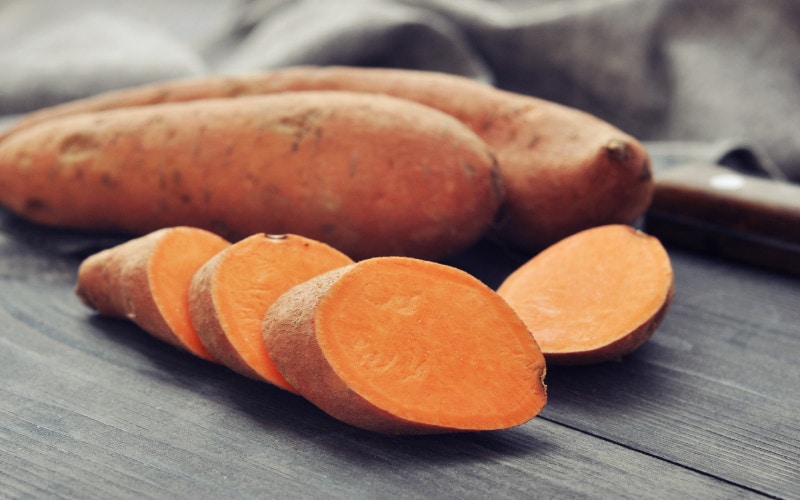
Click to Skip Ahead
As a dog owner, understanding what’s beneficial and safe for your furry family member is critical. A common query that comes to mind is regarding the advisability of feeding dogs sweet potatoes. If prepared in the correct way and given in measured quantities, your dog can eat sweet potatoes, and they can actually serve as a hearty and nutritious part of your precious puppy’s meal. In fact, sweet potatoes are filled with vitamins A, B6, and C, along with minerals like potassium, magnesium, calcium, and even iron!
Benefits of Sweet Potatoes for Dogs

Sweet potatoes bring several health advantages for dogs. The presence of vitamin C in sweet potatoes can bolster the immune system and improve white blood cell activity. Potassium supports the function of blood vessels and muscle growth, and it also replenishes lost electrolytes. Sweet potatoes come with anti-inflammatory and antioxidant attributes that help combat cancer. Therefore, they’re a fantastic option for dogs with food sensitivities. Moreover, these root veggies, loaded with dietary fiber, may also help regulate blood pressure and boost digestion.
The Immune-Boosting Power of Vitamin C
Vitamin C is quite essential to a dog’s immune system. While dogs can produce their own Vitamin C, supplementation may still be of help. Vitamin C promotes the production of white blood cells, which help boost the immune system and keep your pet happy and healthy. A strong immune system makes them more able to fight off disease.
However, please keep in mind that too much of anything can lead to problems. Overindulgence may result in upset tummies. Therefore, to prevent vitamin C overdose from sweet potatoes, ensure that you give them in small, well-regulated quantities.
Muscle Health and Blood Vessel Function with Potassium
Potassium is a crucial mineral that aids dogs’ muscle health and operation. This mineral plays a pivotal role in nerve impulse conduction and muscle activity regulation. By ensuring your dog gets sufficient potassium, you can significantly enhance its muscle health and vitality.
Dogs can sometimes get a little too much potassium in their system. It’s a condition known as hyperkalemia. When it happens, things like muscle weakness, strange heart rhythms, and worst case scenario, heart failure can take place. But don’t panic, it’s not common. And your dog probably won’t get it from healthy foods like sweet potatoes, as long as you’re not going overboard with portions.
Antioxidants: Nature’s Defense Against Cancer
Sweet potatoes are jam-packed with goodies like beta-carotene—which gives them their lovely orange glow—that can really jazz up your dog’s diet. These antioxidants are like little warriors, battling it out with the nasty free radicals that mess with cells and can cause serious problems like cancer. By sneaking some sweet potatoes into your dog’s food, you’re giving them a bit of a bodyguard against this cell damage.
But, while antioxidants are a boon to health, they’re only one piece of the dietary puzzle. Filling your dog’s bowl with too many sweet potatoes or an excess of any food can throw their nutrition off-kilter. So remember, the secret is in balancing a variety of foods and practicing portion control. Moderation is the name of the game in canine nutrition.
Natural Anti-Inflammatory Properties for Allergy Relief
If your furry friend struggles with food allergies or has skin that’s easily irritated, sweet potatoes could be their saving grace. These earthy tubers have a natural knack for calming inflammation, which could help alleviate any itching or discomfort your dog might be experiencing due to allergies. Plus, they’re packed with dietary fiber, which can contribute to a happy, healthy digestive system and reduce the chance of tummy troubles associated with food sensitivities.
But remember, not every dog has the same dietary needs. If your pooch has a history of allergies or other health conditions, it’s a smart move to chat with your vet before introducing sweet potatoes, or any new food for that matter, into their diet. Monitoring portion sizes and observing how your dog reacts to the new addition can ensure sweet potatoes are doing more good than harm. After all, you want the best for your four-legged friend.

Potential Health Concerns
Think of sweet potatoes like those deliciously tempting treats we all love but know we shouldn’t have too much of. Yes, they’re great for dogs in moderation, but there’s such a thing as too much of a good thing. Despite being packed with carbs, sweet potatoes can bring on trouble if your dog gets carried away. We’re talking about risks like diabetes and pancreatitis. So, if your pup is fighting the battle of the bulge or already has diabetes, it might be better to skip the sweet potatoes. They can send blood sugar levels soaring and add unwanted weight.
Research conducted by the US Food and Drug Administration (FDA) suggests that foods containing potatoes could increase the risk of a heart condition called canine-dilated cardiomyopathy (DCM). While it’s not conclusive, and multiple factors are likely at play, it’s advisable to feed potatoes, including sweet potatoes, in moderation.
How to Feed Your Dog Sweet Potatoes Safely
To feed sweet potatoes to your dog safely, ensure that they are thoroughly cooked. Avoid adding any seasonings, butter, oil, or salt, as these can be harmful to dogs. Baked or boiled sweet potatoes are safe and nutritious choices. You can also include sweet potatoes in homemade dog treats or use them as stuffing in interactive puzzle toys, like Kongs.
Always Steer Clear of Raw Sweet Potatoes

Never feed raw sweet potatoes to dogs. They belong to the nightshade family and contain solanine, a toxic compound. Cooking sweet potatoes significantly decreases the levels of solanine, making them safe for dogs. Symptoms of solanine poisoning include upset stomach, blurred vision, and a reduced heart rate, which necessitates immediate veterinary care.
Frequently Asked Questions
Q: Can puppies eat sweet potatoes?
A: Yes, puppies can have sweet potatoes, but they should be given in moderation, just like adult dogs.
Q: How should I prepare sweet potatoes for my dog?
A: Baked or boiled sweet potatoes without any seasonings or additives are the best choices for your dog. Avoid any seasonings, butter, oil, or salt.
Q: Can I feed sweet potatoes to older dogs?
A: Yes, older dogs can have sweet potatoes, but it’s essential to consider their specific dietary requirements and consult with your vet first.
Q: What will happen if I overfeed sweet potatoes to my dog?
A: Overfeeding sweet potatoes can lead to health problems, like pancreatitis and weight gain.
Conclusion
Being a responsible pet parent involves ensuring that our furry companions receive the right nutrition. Answering the question of dogs and sweet potatoes, we’ve discovered that our canine friends can indeed benefit from these nutrition-packed veggies. Loaded with vitamins and minerals, sweet potatoes provide immune-strengthening vitamin C, muscle-boosting potassium, and antioxidants that fight cancer. Additionally, their inherent anti-inflammatory properties make them an excellent choice for dogs with food allergies.
However, like all good things, moderation is crucial. Overfeeding sweet potatoes can lead to health complications, especially for dogs with pre-existing conditions like obesity or diabetes. It’s crucial to cook sweet potatoes thoroughly for their safety, as raw ones contain solanine, a toxic compound. Baked or boiled sweet potatoes without added seasonings are recommended.
So, if you’re considering introducing this nutritious treat into your dog’s diet, start with small portions and consult your vet if necessary. Just as a thoughtful gift box brings joy and wellness, offering our canine pals a balanced and varied diet, including moderate servings of sweet potatoes, can contribute to their overall health and happiness.
Featured Image Credit: mama_mia, Shutterstock
The post Can Dogs Eat Sweet Potatoes? Vet Approved Facts & FAQ appeared first on Pet Keen.






